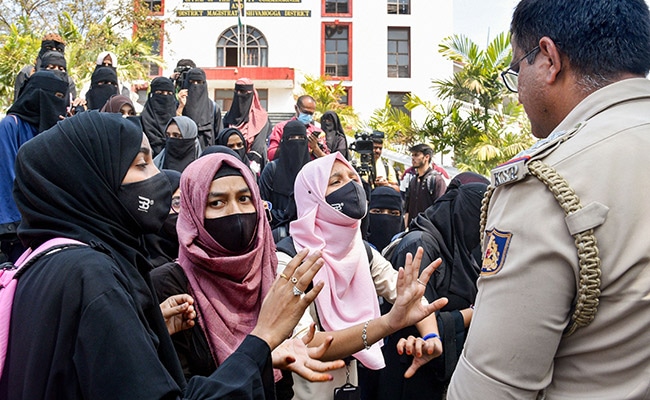
The Karnataka High Court will today give its verdict on the Hijab ban issue. Hijab, or headscarves worn by Muslims, became a flashpoint when students were not allowed to enter classrooms before removing them. 5 students challenged the ban in court.
Ahead of the verdict, Karnataka Home Minister Araga Jnanendra met Chief Minister Basavaraj Bommai at his residence to brief him on the security and police department. The court is expected to deliver the verdict at around 10:30 am.
The state government has banned large gatherings for a week in state capital Bengaluru "to maintain public peace and order". Mangalore too has banned large gatherings from March 15 to 19. The Udupi district administration has declared a holiday in schools and colleges today.
The Karnataka High Court had temporarily banned religious clothes, including Hijab and saffron scarves, last month as the controversy snowballed into protest demonstrations and several Muslim students being harassed by a section of students who turned up in saffron scarves, arguing they were also linked to religious identity.
The petitioners, including a dozen Muslim female students, have told the court that wearing the hijab was a fundamental right guaranteed under India's constitution and essential practice of Islam. After eleven days of the hearing, the High Court had reserved its judgment on February 25.
Teachers along with students were not allowed to enter schools and colleges for wearing the hijab in many parts of the state since then. Videos of students and teachers removing the Hijab in public to be allowed inside educational institutions had triggered a massive outcry. The High Court had then clarified that the temporary ban applied only to students and not teachers.
The controversy over the hijab erupted in Karnataka late last year as students at a school in Udupi refused to remove headscarves and stop their use despite requests from teachers. Five students then went to court.
On February 5, Karnataka banned "clothes that were against law and order" and on February 10 the High Court temporarily banned all religious outfits as it heard petitions challenging the restrictions.
While the case was being heard at the court, which had reserved judgment, over 100 students were not allowed to take the final practical exams.
Late last month, the Karnataka government had contended before the high court that wearing the hijab is not an essential religious practice of Islam and preventing it does not violate the constitutional guarantee of religious freedom.
Karnataka's move led to protests in some other parts of the country and drew criticism from the United States and the Organisation of Islamic Cooperation.

